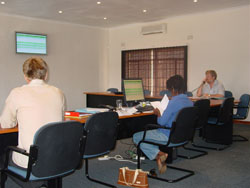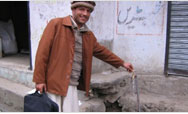You are here » Home » Telling Our Story
Success Story
Commodity exchange ensures farmers receive
best price for their crops
Modernizing Trade for Farmers

Photo: ACE
The Agricultural Commodity Exchange for Africa based in Lilongwe, Malawi, gives small-
scale farmers leverage in negotiating for their crops.
Ian Goggin, managing director of ACE, said, “Access to wider markets and increased competition can have a positive effect on small-scale farmers.”
In Malawi, small farmers in remote rural areas have a difficult time accessing markets for their crops, and lack of information about prices puts them in a weak bargaining position with traders. Low prices or an inability to sell their crops discourages farmers from future food production, and exacerbates the severe poverty in rural areas where agriculture is often the sole source of income.
USAID helped establish the Malawi-based Agricultural Commodity Exchange for Africa (ACE) to address this situation. The exchange also improves marketing of agricultural commodities by ensuring the maintenance of standards.
ACE assists Malawi’s farming community as a whole and the small-scale farming sector in particular. It provides farmers with reliable market information, both pre- and post-harvest, which improves competition and communications, and ensures higher prices for higher quality. It has also helped improve access to local, regional and international markets for farmers, offering full transparency, enforceable contracts, an arbitration facility, and more efficient and cost effective markets.
One small but important example of how ACE improves farmers’ lives occurred when a farmer’s association was offered 45 Malawian kwacha (about 30 cents) a kilogram for approximately 12 tons of soya beans. The association wasn’t satisfied with the bid, so ACE agreed to trade the soya beans on the association’s behalf and offered them for sale on its trading platform, through the Internet, at 57 kwacha (41 cents) per kilogram. The sale was agreed upon the same day, after which it was revealed the buyer was the same one who had previously offered the farming group only 45 kwacha.
As ACE continues to help farmers, their livelihoods will improve and trade will become fairer. To date, more than 7500 tons of groundnuts, whole cotton seed, hominy chop, cotton seed meal, maize bran, sugar beans, soya beans and jatropha seed, with a value of almost $3.5 million, has been traded through ACE to support small-holder farmers.
Print-friendly version of this page (533kb - PDF)
Click here for high-res photo
Back to Top ^ | 

